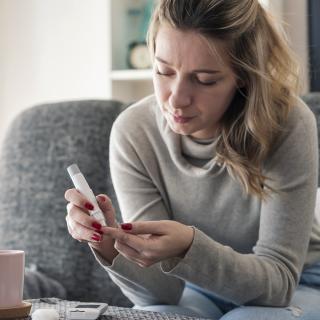The dangers of low blood sugar (hypoglycemia) — and what you can do about it

Your blood sugar fluctuates throughout the day, going up or down depending on the food you eat, how much you exercise, the medications you take, and even your stress level.
Most of the time you probably won’t notice these fluctuations because they’re within what’s considered a target range. Blood sugar below 70 mg/DL is considered low and can be dangerous especially if you have diabetes.
Low blood sugar is called hypoglycemia and it’s especially common among patients with diabetes who take certain types of medications. A large global study found that 4 out of every 5 patients with type 1 diabetes, and nearly half of those with type 2 diabetes, reported low blood sugar at least once over a four-week period.1
As long as you’re aware of the symptoms of hypoglycemia, there are plenty of things you can do to bring your blood sugar back to a healthy level. However, if left untreated, hypoglycemia can cause serious side effects and potentially land you in the hospital.
The hypoglycemia-diabetes connection
Your body converts carbohydrates in foods like fruits, vegetables, dairy, and bread products into glucose, and requires insulin to transport it into cells and tissues for energy. Normally, when your blood sugar levels drop too low, your body either produces more glucose or releases extra glucose that has been stored in the liver and muscles.
However, in some patients with diabetes, this response to normalize glucose is impaired. Certain medications used to treat diabetes, such as insulin, can also prevent glucose levels from easily returning to the normal range.
What causes low blood sugar?
For patients with diabetes, hypoglycemia occurs when there’s too much insulin in your system. This can happen if you:
- Eat less than normal.
- Skip meals.
- Exercise more than usual.
- Don’t eat enough carbohydrates for the amount of insulin (or other diabetes medication) that you take.
What are the symptoms of low blood sugar?
When your blood sugar gets too low, you can experience symptoms like:
- Sweating
- Shaking
- Fast heartbeat
- Feelings of nervousness or anxiety
- Dizziness
- Hunger
- Irritability
Hypoglycemia unawareness
Some people, particularly those with type 1 diabetes who experience repeated episodes of hypoglycemia, may develop hypoglycemia unawareness. This is when you no longer experience the typical symptoms of low blood sugar and are therefore less likely to treat it. Hypoglycemia unawareness is dangerous and puts you at risk for developing severe symptoms like clumsiness, confusion, seizures, fainting, and even death.
How to treat low blood sugar
Your treatment for hypoglycemia depends on the severity of your symptoms. If your symptoms are relatively mild, you’ll want to follow the 15-15 rule. Eat or drink 15 grams of glucose or carbohydrates, wait 15 minutes, then check your blood sugar. If it’s still too low, repeat this process until it’s back to your target range.
Eating or drinking won’t be enough if you’re prone to severe hypoglycemia. In this case, your doctor will prescribe glucagon. Glucagon is a hormone that raises your blood sugar levels and can be given as a nasal powder or by injection. Your doctor may also recommend keeping an emergency glucagon kit with you. Just remember to check your kit periodically to ensure that it’s stocked and that the medication hasn’t expired.
How to prevent hypoglycemia
The best way to prevent hypoglycemia is to detect low blood sugar before you develop serious symptoms. You can do this with a meter or continuous glucose monitor (CGM). Here are some other things you can do:
- Time your medications. As with all medications, always take diabetes medication in the recommended dosage and at the recommended time. Some diabetes medications can cause hypoglycemia. If you have any questions, your doctor or pharmacist can help explain how and when to take these medications.
- Watch what you eat. Following a meal plan is important for managing diabetes. Have enough food during each meal, avoid skipping meals, and try healthy snacking. If you are struggling with your food intake, work with a registered dietitian who can help design a meal plan that fits your personal preferences and lifestyle. Eating right will help you manage your diabetes.
- Exercise responsibly. Check your blood glucose before sports, exercise, or other physical activity and adjust medication if necessary. Have a snack handy if your levels fall below 100 mg/dL. Also, check blood glucose at regular intervals during extended periods of physical activity and periodically after physical activity, and adjust medications if necessary.
- Limit alcohol consumption. Drinking a lot of alcohol, especially on an empty stomach, can block your liver from releasing stored glucose into your bloodstream. If you want a drink, do so in moderation and with a snack or meal.
Helping you manage your blood sugar
Managing your blood sugar starts with getting a strong handle on your diabetes. Express Scripts® Pharmacy gives you 24/7 access to specially trained pharmacists who understand the complexities of your condition and can give you personalized care and guidance to manage your therapy.
1 National Institute of Diabetes and Digestive and Kidney Diseases: Low Blood Glucose (Hypoglycemia) (accessed February 2022): https://www.niddk.nih.gov/health-information/diabetes/overview/preventing-problems/low-blood-glucose-hypoglycemia
Original posted date: April 12, 2022
Posted date: July 23, 2024


